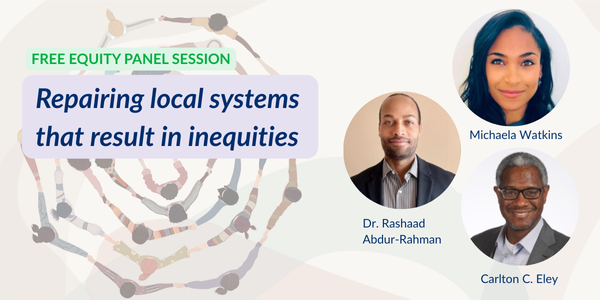Repairing Local Systems that Result in Inequities
This panel discussion brought together national experts from Race Forward and the Government Alliance on Race and Equity (GARE) to explore how local government systems can be reimagined to serve everyone more equitably.
In a time when equity efforts are under scrutiny, public sector leaders across the country continue to do the work—strategically, collaboratively, and courageously.
This session offered more than insight—it offered fuel.

- Michaela Watkins, Deputy Director, Network Strategies, GARE
- Dr. Rashaad Abdur-Rahman, Director of State Strategies, Race Forward
- Carlton C. Eley, Senior Director for Federal Strategies, Race Forward

- Examples of system-level inequities and how agencies can address them.
- Practical tools and frameworks for advancing racial equity in government.
- Strategies for navigating political and legal pushbacks while sustaining progress.
- The role of public narrative and storytelling in driving lasting systemic change.
- Practical resources, social impact tools, and equity assessment frameworks.

- Equity work persists—despite the headlines. Even amid legal, cultural, and political resistance, agencies across the country are standing firm, finding new ways to advance racial justice even as pressure mounts.
- You are not alone. Inequities thrive in isolation and vacuums. There is a large national coalition of resources to partner with in addressing and repairing systemic inequities.
- Courage is essential. In today’s climate, agencies must lean into values-driven leadership—even when it’s hard.
- Equity isn’t reactive—it’s proactive. Equity must be embedded upstream—not treated as a last resort when things go wrong. A panelist Michaela Watkins said, “Racial equity isn’t just a reactionary practice—it’s a prevention and mitigation strategy.”
- Codification is key. Equity must be woven into laws, policies, and budgets to survive political shifts and remain actionable over time. As panelist Carlton Eley said, “I stopped trying to convince people to change their work and focused on what I had control over. That’s how I created impact.”
- Narrative and storytelling matter. Panelists emphasized the power of shifting public narratives and humanizing communities most impacted by inequities. As panelist Dr. Abdur-Rahman shared, “You don’t lose when you humanize people.”
- The right tools are out there. Race Forward and GARE continue to offer proven resources, support networks, and step-by-step strategies to help agencies make meaningful progress.










